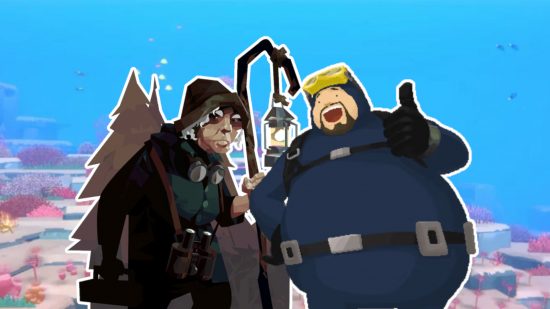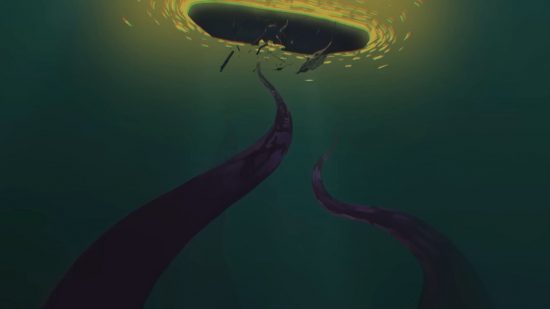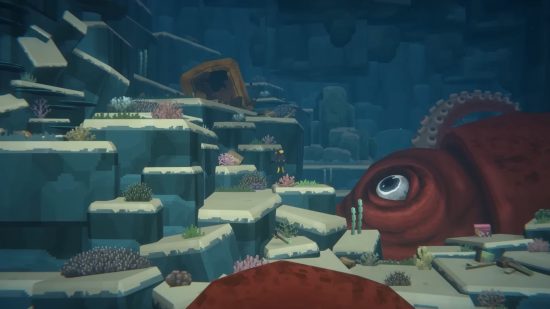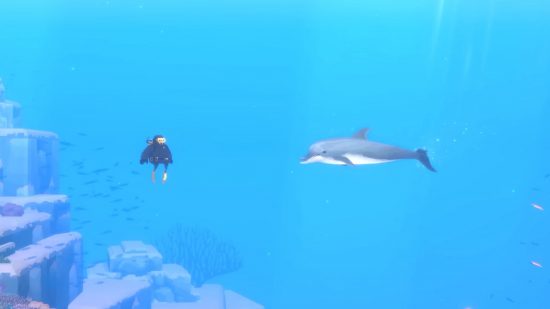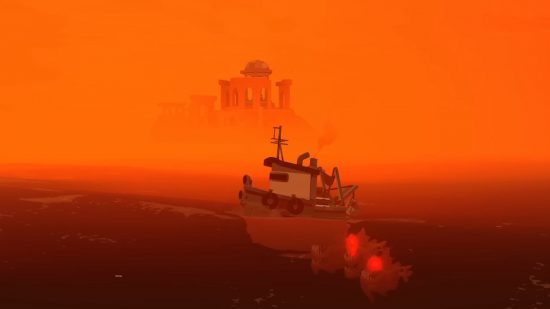For the longest time, humans have had an obsession with the ocean. Considering it’s everywhere, who can really blame us? Nowhere is this more obvious than in the creative realm. From Homer’s Odyssey to Hemingway’s The Old Man and the Sea, with plenty of examples in between, there’s something about the water that inspires the mind. That’s been especially true in gaming in 2023, with two of my favorite games of the year showing us just how captivating the sea can be and how important it is to respect it.
For those who don’t know, Dredge and Dave the Diver both take place, as you might imagine from the subject of this article, on the water. Or under the water, in Dave’s case. While each game has a distinct version of the ocean, there are similarities. The most significant similarity is how both games display the power dynamic between humans and the sea. Put simply, we think we’re the dominant force, but there’s nothing more humbling than the water. Even in the age of instant communication, space travel, and all the rest of it, the big body that takes up 71% of the planet is our equalizer.
While both games have an element of the supernatural – Dave the Diver’s underwater mermaids and Dredge’s miasma-inducing demon fish – each first presents the ocean as a giver of life. In the old-fashioned sense, the sea is where we fish, we turn fish into food, and food sustains us. Both Dave and Dredge’s unnamed fisherman don’t go out into the depths for the fun of it or even for research purposes like James Cameron and his fleet of underwater vessels but as a means to an end. The water provides work, and everyone needs work.
In the first hour or so of each, Dredge and Dave the Diver almost come across as seemingly cozy fishing games, the latter more so thanks to some colorful pixel art and lighthearted dialogue with big Dave himself. However, before long, the ocean shows its true colors. In Dredge, night comes with a haunting ocean demon that can easily take your vessel and turn it into a shipwreck. It takes a little longer in Dave the Diver, but before you know it, you’re facing down menacing giant squids, phantom jellyfish, and massive zombie mermen. Yes, you heard that last bit right. Giant. Zombie. Mermen.
Humans have always feared the unknown, and considering we’ve explored just 5% of the sea, so much of the ocean still falls into that category. Each game employs this to different ends, and it’s fair to say that Dave the Diver’s unknown is much less daunting than that of Dredge. Still, in both games, it’s the classic battle between humanity’s desire to explore beyond its means and nature’s often dramatic response. Dredge is almost a revenge story, with a vengeful ocean getting its own back on humans through the psychological torture of one individual by unleashing its hidden horrors.
Of course, the supernatural brings the spook factor quite significantly to both games, especially Dredge, but both accentuate this fear of just how isolating and overwhelming being alone in the water is. As the old saying goes, “In space, no one can hear you scream,” the same is true when navigating the depths with Dave or fleeing the miasma in Dredge. As countless sailors, pirates, and explorers have learned the hard way over the years, if something goes wrong in the water, it usually goes quite badly wrong. As another saying goes, “Worse things happen at sea.”
No matter which ending you opt for, Dredge ultimately shows you that no man is a match for the will of the ocean. Of course, it doesn’t help that a seriously evil and apocalyptic power inhabits this particular ocean, but the message reads all the same. The sea is a force of nature like death itself, and there’s no bargaining with that and no bringing someone back from it when they go too deep.
Still, while both Dredge and Dave the Diver highlight the terrifying power and all-encompassing nature of the ocean, they also highlight its beauty. This beauty might be more abstract in Dredge, with its predominantly Lovecraftian vibes, but it’s true. Just float around in the in-game early morning sun, and you can see that for yourself.
It might not be a purposeful message from the developers, but if you respect the ocean, know your limits, and appreciate what might be waiting in the water, you can avoid the monsters for a long time. If you’re not bothered about completing the game, Dredge actually serves as a quaint little fishing simulator. Just dock by nightfall, and you’re almost oblivious to the eldritch undertones.
While the wonder of the ocean is a little more difficult to grasp in Dredge, especially in its tragic conclusion, it’s very apparent in Dave the Diver. The ecological message of the co-dependent relationship between us tiny humans and the water surrounding us is everywhere. It’s no clearer than in Dave’s antagonist relationship with John Watson, a supposed eco-warrior who says he’s saving dolphins when, in reality, he’s hunting them down to harvest their meat.
Sure, Dave is taking from the sea himself, but he’s what you might call an ethical fisherman. This definition means that Dave takes fish at a rate that allows them to repopulate while avoiding wiping out endangered species like the rare whales. This message sits alongside the general consensus on how we should treat the ocean. Small trawlers collecting enough fish for individual communities aren’t the real problem, but commercial fishing is.
To this day, overfishing and bycatching destroy communities of underwater fish by decimating populations with little regard for future generations, damaging oceanic habitats. Dave the Diver subtly points this out while poking fun at companies who would have you think that it’s environmentally friendly as they continue to pollute the sea with plastics or tear apart the habitats of endangered underwater species.
So, what do both Dave the Diver and Dredge teach us about the ocean? It’s all about humanity’s relationship with the sea, how it inspires us, and how we need to respect it, both in terms of caring for it and acknowledging its potential for snatching away human life. The water is something of a paradox, simultaneously beautiful and terrifying, freeing and obtrusive, welcoming and vengeful. Outside of the expanse of space, it’s one of the few areas where humans have such little control.
We, as people, need to learn to accept that lack of control, respect it, and continue to fight for a future where our grandchildren can experience the awe, horror, and majesty the deep blue represents. If we want the ocean to still be the source of inspiration it is now and always has been, in another 50 to 100 years’ time, we can’t take it for granted. As Dave goes out of his way to protect the sweet pink dolphin he happens across, we have to go out of our own way to make sure there’s a future for the creatures that inhabit the seas, or just like in Dredge, the terror may overwhelm the beauty before too long.
While you’re here, be sure to see what we made of gaming in 2023 with the Pocket Tactics Awards for the best mobile games of the year and best Switch games of the year. Or, if you’re a Dredge fan searching for more suspenseful experiences, see our list of the best horror games on Switch and mobile.
